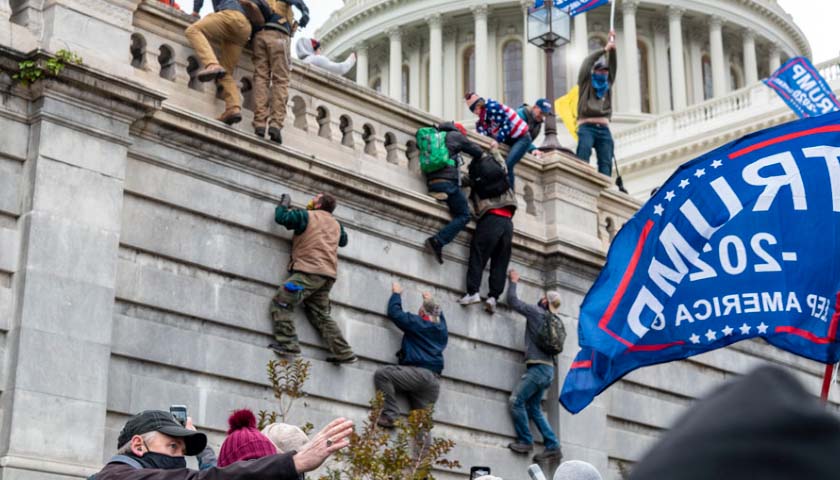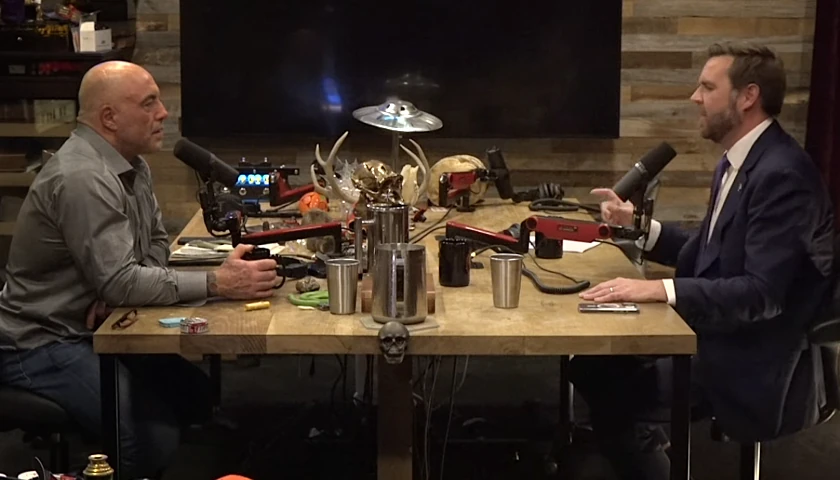by Julie Kelly
The New York Times often acts as the spin cycle for the Democrats’ dirty laundry. For years, Times reporters have helped get ahead of damning news, especially when it’s related to the Russian collusion hoax, in an attempt to establish the narrative early.
A recent example is the Times article downplaying the pending indictment against Michael Sussman, the Clinton campaign lawyer who acted in cahoots with the FBI to seed the collusion tale before the 2016 election. The article was published the day before Sussman pleaded not guilty of lying to the FBI.
On Saturday, the Times published a carefully constructed bombshell intended to soften the blow of an explosive scandal in the making: the FBI had at least one informant among the group of Proud Boys who marched on the Capitol on January 6. The informant, according to “confidential documents” furnished to the paper, started working with the FBI in July 2020 and was in close contact with his FBI handler before, during, and after the Capitol protest.
“After meeting his fellow Proud Boys at the Washington Monument that morning, the informant described his path to the Capitol grounds where he saw barriers knocked down and Trump supporters streaming into the building, the records show,” reporters Alan Feuer and Adam Goldman (the Times reporter most responsible for priming the ground for news that was unfavorable to the Russia collusion narrative) wrote on September 25. “In a detailed account of his activities contained in the records, the informant, who was part of a group chat of other Proud Boys, described meeting up with scores of men from chapters around the country at 10 a.m. on Jan. 6 at the Washington Monument and eventually marching to the Capitol. He said that when he arrived, throngs of people were already streaming past the first barrier outside the building, which, he later learned, was taken down by one of his Proud Boy acquaintances and a young woman with him.”
In other words, one of the informant’s Proud Boy “acquaintances” was removing temporary barriers to allow a crowd to enter the restricted grounds around the building.
Sounds legit.
But there’s more to come, Feuer and Goldman warned. “The F.B.I. also had an additional informant with ties to another Proud Boys chapter that took part in the sacking of the Capitol,” they wrote. In a tweet linking to his article, Feuer admitted other FBI assets “may emerge, further complicating the picture of Proud Boys activity on Jan 6,” he posted.
The emergence of numerous FBI informants or undercover agents won’t complicate the “picture” of the Proud Boys participation in January 6. It will, however, complicate the groupthink shared by the media, Democrats, and NeverTrump Republicans that the FBI played no role in organizing or perpetrating the “attack” on the Capitol, suspicions raised by myself and the late Angelo Codevilla here at American Greatness, and Darren Beattie at Revolver News months ago.
Even more ridiculous is how the Times attempts to debunk those suspicions: “The new information was revealed at a time when misinformation continues to circulate among far-right commentators and websites accusing the F.B.I. of having used informants or agents to stage the attack on Jan. 6. And the records show that the informant traveled to Washington at his own volition, not at the request of the F.B.I.”
Color me crazy, but an informant working with the FBI—and getting paid to do so—didn’t exactly need an invitation from Christopher Wray to get to the scene of a major political event on January 6.
Since the summer of 2016, the Federal Bureau of Investigation has used every tool in its extensive and potent arsenal to target Donald Trump. This included the use of confidential informants, FISA warrants, leaks of classified information, and sketchy documents such as the Steele dossier produced by another FBI asset at the time, Christopher Steele.
As I’ve written for months, the FBI now is turning those weapons against Trump-supporting Americans.
The Times’ newest revelation tracks with what happened in the FBI’s orchestrated plot to “kidnap” Michigan Governor Gretchen Whitmer last year. BuzzFeed reported in July that at least a dozen FBI informants helped concoct the plan. “Working in secret, they did more than just passively observe and report on the actions of the suspects,” Ken Bensinger and Jessica Garrison wrote. “Instead, they had a hand in nearly every aspect of the alleged plot, starting with its inception. The extent of their involvement raises questions as to whether there would have even been a conspiracy without them.”
Informants worked with the alleged kidnappers for months, using encrypted chats, organizing secret meetings, and instigating criminal behavior. As the trial date looms for the five remaining defendants in the Whitmer case—one conspirator pleaded guilty last month—the role of the FBI is earning more scrutiny. The special agent in charge of the operation was fired after his arrest for assaulting his wife; defense attorneys just asked the judge for a 90-day delay in the trial to investigate possible wrongdoing by other FBI informants and agents in the case.
Questions also persist about numerous unindicted co-conspirators in the January 6 “conspiracy” case against 18 alleged members of the Oath Keepers. As Beattie detailed in June, Stewart Rhodes, known as Person One in the Oath Keepers indictments, has not been charged eight months later despite his central role in organizing the so-called “attack” on the Capitol. (Read his work here.)
In fact, after Beattie’s articles posted in June, Alan Feuer, the same reporter who co-authored this weekend’s spin story, wrote a piece disclosing Rhodes had been interviewed by the FBI in May. (Feuer’s article, conveniently, was posted after FBI Director Wray testified twice on Capitol Hill this week.)
Further, in my interview with him this week, Thomas Caldwell, one of the first people arrested in the Oath Keepers case, told me Rhodes approached him during a Stop the Steal rally in Virginia last November. Rhodes told Caldwell the Oath Keepers provided security for conservatives and asked if he’d be interested in assisting in the future.
Caldwell gave Rhodes his contact information, which led to Rhodes connecting Caldwell with other Oath Keepers; plans were made to travel to D.C. and meet near the Capitol after Trump’s speech on January 6.
Caldwell’s home was raided and he was arrested on January 19, just two weeks after the protest. Prosecutors already had a trove of evidence against Caldwell, which is highly curious considering Caldwell never entered the building and was charged with no violent crime.
How did the government get Caldwell’s information so quickly? It certainly suggests the involvement of someone working on the inside, someone who immediately provided investigators with incriminating evidence.
Someone like an FBI informant.
One thing is certain; the Times damage-control article is just the tip of the FBI iceberg. And more proof January 6 was an inside job.
– – –
Julie Kelly is a political commentator and senior contributor to American Greatness. She is the author of Disloyal Opposition: How the NeverTrump Right Tried―And Failed―To Take Down the President. Her past work can be found at The Federalist and National Review. She also has been featured in the Wall Street Journal, The Hill, Chicago Tribune, Forbes, and Genetic Literacy Project. She is the co-host of ‘Happy Hour podcast with Julie and Liz.’ She is a graduate of Eastern Illinois University and lives in suburban Chicago with her husband and two daughters.
Photo “Capitol Jan. 6” by Blink O’fanaye. CC BY-NC 2.0.








